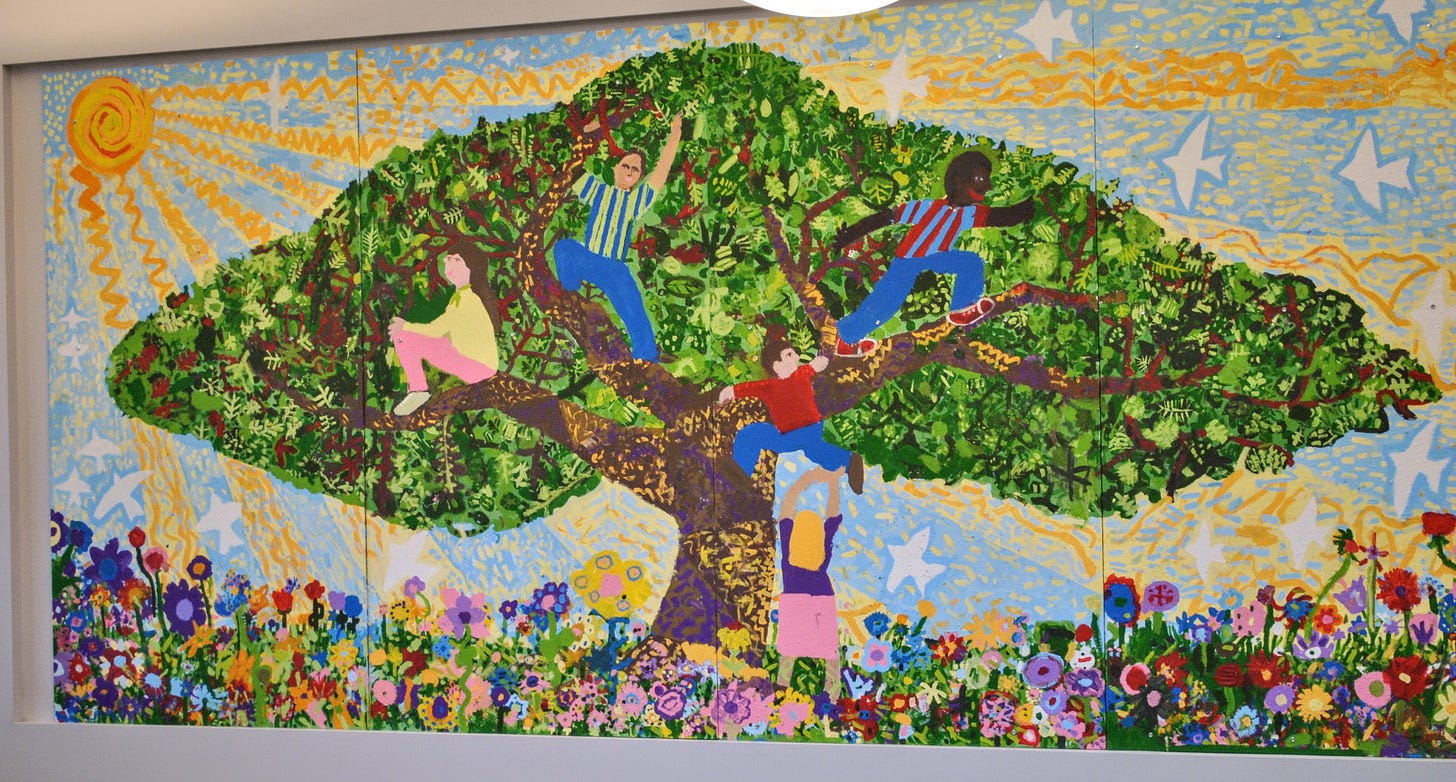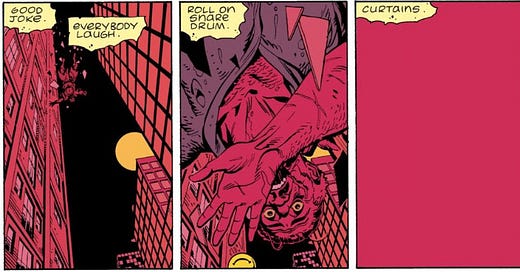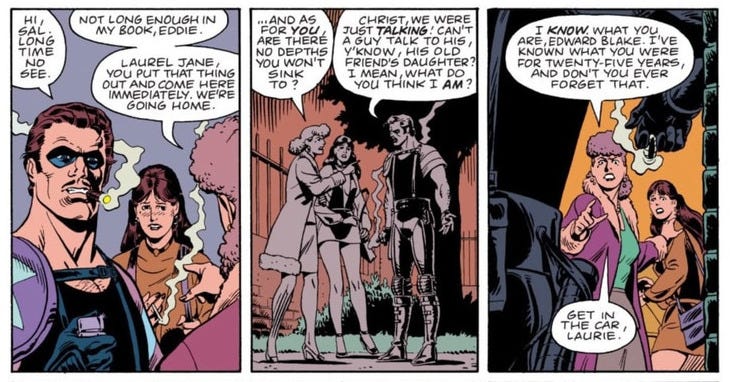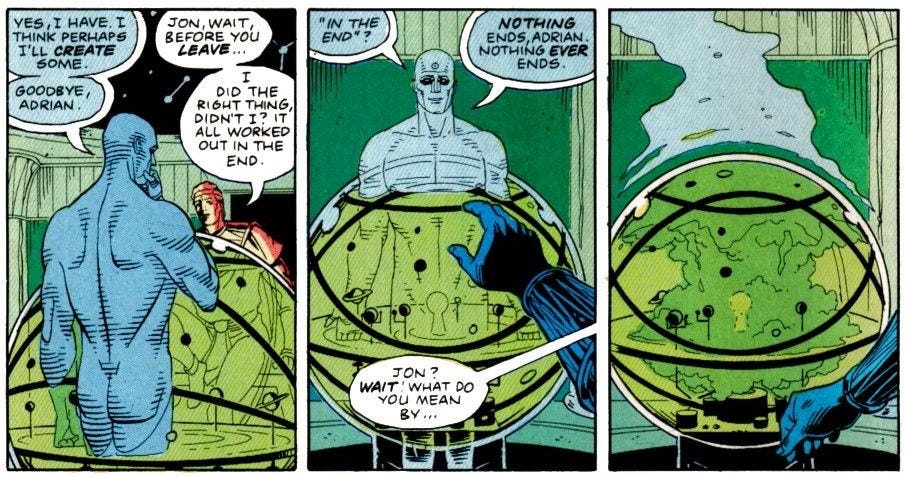The Teacher and The Comedian (part 2)
I learned to communicate just so I could tell you a bad joke!
My Inner Comedian thinks it’s Funny
I met my ex’s ex-husband a handful of times. I wasn’t impressed by him but I remember him very well. His bald head. His beady little eyes behind thick glasses. His pasty skin and his grin. He was a staunch republican and a loyal viewer of Fox news. He despised progressivism and balked at notions of social justice. He was deeply Machiavellian; always scheming. Because of his political views, he wasn’t thrilled that his ex-wife’s new partner was Arab and Muslim.
The ex-husband wasn’t talented or charismatic, so at the time I couldn’t see what he was all about. What was his purpose in life? He seemed to live for one purpose only: to irritate my ex-wife.
He used everything at his disposal, including her kid, as a tool to torment her. I witnessed firsthand as he waged psychological warfare through shared custody disputes, late drop-offs, missing clothes, misplaced belongings, bickering at karate practice, and anything else he could think of to make her feel like a bad single mother. He knew her buttons and was determined to push them all.
This was all new for me, and I tried to help, but I was utterly out of my depth. I was a fish out of water.
I couldn’t protect her from her own way of thinking. I also had little influence over her. She was older than me by five years, way smarter than me as an Ivy league grad, and I had no experience with the kind of baby-daddy drama that dominated her life. Suddenly, I found myself thrown into a crash course on what it means to be divorced with shared custody.
I tried to talk with her, work with her, plan with her, and find ways to help her see what was happening to her. She was so easily triggered by his traps that my efforts were futile. I was pretty young at that time, much too young for this type of drama, and much too young to realize that he would ultimately target me as well.
The Disease or The Cure?
While people were calling me a predator behind my back, I was the one person who knew both topics involved (sex addiction and child psychology) better than anyone. I was the one best positioned to educate young people on topics of abuse, sexuality, and addiction; had I not been defamed.
I was labeled as someone for children to be afraid of, even though I’m the one best positioned to protect them from any form of harm. To me that has fantastic irony. Instead of becoming a cautionary tale and a target of mockery, I could have used my own insights to educate students and prevent lots of them from becoming addicts in the future, which was all but guaranteed given the pervasiveness of porn usage amongst middle schoolers of both genders.
I’m far from perfect, and back then I wasn’t the person that I am now. But hurting children is so far beneath me that it’s absurd. That’s more of the ex-husband’s thing. A predator likes bending people to his will. I like giving people a backbone so they can’t be bent. He spends his time meddling in the lives of others, while I spend mine living my own.
My addiction had nothing to do with children. I wouldn’t have gone into education if that weren’t the case. I was also in therapy and every therapist I worked with would have intervened if I were a danger to kids. In fact, I knew many recovering addicts who taught children. There’s something powerful and purifying about the honesty of the 12-step process, and that honesty makes people into excellent teachers.
Because I was awful at communication, I avoided discussing sexual or controversial topics with my teenage students, even when they had genuine questions about sexual health or social justice. I felt unqualified to answer because my own relationship with sexual health and psychology was defined by recovery, not perfection. In other words, I was in recovery, so how could I be asked to dispense advice?
I figured that if I was wise on this topic, perhaps I wouldn’t be in recovery.
From my years in meetings, I have an applied knowledge of sex addiction that trumps the academic insights of most therapists, save those who specialize in treating sex addiction. I’ve spent more than 10 years of my life in meeting rooms full of sex addicts and heard thousands of stories from every type of sex addict there is, with every level of sobriety from newcomers to old timers. And I’ve also read lots of books about sex addiction including the works of Dr. Patrick Carnes whose research on the topic goes back decades.
For my understanding of sex addiction and how to prevent it, I’m the cure, not the cancer. That also goes for any of us addicts who’ve spent years in meetings. We know so much about addiction and how to heal it.
On top of that, as a teacher I have an applied and practical understanding of child psychological development, which is necessary in order to orchestrate an emotionally safe and productive environment. I always used my teaching experience to properly understand the motivations behind children’s behavior. Once I fully understood children and what they’re trying to communicate, I discovered the best courses of action to create a safe and nurturing environment. Like most good teachers, I taught my students to express themselves through their art and creativity, and to use their words. I taught them to help each other and not argue, and to develop their ideas rather than be quickly self-satisfied.
So I’m the very person with the type of expertise needed to address abuse and actually prevent harm to children, because I know enough about sex addiction, and plenty about child psychology. I am literally the safest person for children to be around. I’m capable of preventing even the most minimal of suffering, to say nothing of preventing serious abuse.
But you can see now how someone might invent a story, connecting my very private recovery with the very public work that I used to do, and then distorting the message so that it represents something far more sinister than simply art teacher + recovering porn addict.
If someone tacked onto that narrative the stereotypes about my religious and racial identity, the story could become very compelling, especially to those with a strong bias or limited experience with people from the Middle East.
That’s why I should have been told what was happening right away.
Had my colleagues from a decade ago had the courage to question the narratives that were brought to them, and confront me directly rather than observe me from afar, I would have discovered this person's campaign of defamation much sooner, and it would have been much easier to counteract it then. I probably would not have gotten divorced, would not have quit teaching, and my life would have been radically different had I known all of it.
How many children missed their shot at success because instead of having an art teacher who believes in them, they had an art teacher they were afraid of? I do not know, but it’s a question worth asking. Should my recovery have been kept private or should it have been outed as a porn-addict to the families of every single student I taught?
I didn’t want to share anything about my private mental health, my program, or my therapy, with my colleagues or students. Those experiences were private and sacred, but that need for privacy allowed others to invent their own narratives about me, and draw conclusions informed more by film and media than by real life. The conclusions that most people came to represent an unrealistic and impossible version myself, and sometimes I find it funny.
This hidden narrative affected everything in my life and I want to tell a mini-story that articulates it. It’s safe to say that my ex thought I was a secret pedophile and thought I was going into teaching just to cover it up-- that’s so crazy to me, but that’s what she believed. She was livid about me getting a master’s degree in education because she was afraid I was going to get into some kind of trouble. Our relationship was full of weird tests, but I was put in charge of her teenage daughter often, and never laid so much as a finger on her.
Community Trust
After my first year teaching after grad school, I came out like gangbusters and all the kids really liked my curriculum. I was teaching art for K-5 at a suburban elementary school. The teachers said they’d never seen the students so energized and excited. In the years that followed there was a whole school project - a mural painted by all the students, which was a smashing success and inspired my 500 students from kindergarten to 5th grade. I also instituted a sort of tradition in my 3rd year of teaching. I organized an exhibition outside the school for my 5th grade students. My 5th graders that year were incredibly proud to have an exhibition at a certain well-respected museum. Those were the kinds of things I did out of a genuine desire to get my students to see themselves as artists early on. Despite my psychology, flaws and shortcomings, I was someone who believed in the power of manifestation, and I wanted to do a little manifesting with my students.

But the hidden narrative might have been that I planned things like a school-wide mural and a community exhibition, just to cover up my inhumanity? I’m not sure if I’m really the one with a problem here. I promoted children’s self-esteem and orchestrated great community recognition events for my students so that they would become mentally and emotionally resilient, and more resistant to addiction and hopelessness than I was. At the same time, I was trying to undo my own trauma and reparent myself to compensate for shortcomings in my environment as a teen.
Isn’t this why it’s said that the road to hell is paved with good intentions?
In my second year teaching elementary school, the school told me that they were renovating the copy room, so the space adjacent to my art classroom (located over the atrium) was to become the new copy room. My classroom was very large and the school proposed that a corridor would be formed going from the door of the room over the atrium, where staff would now make their copies, to a door on the left side of my classroom. Essentially 10 percent of my classroom was cut to make a corridor.
I wasn’t at liberty to protest losing a piece of my classroom, so I rolled with it and asked for wire rack shelves to make a divider. I lost classroom space but got more storage out of the deal. A row of shelves now separated my classroom from people coming in and out of the copy room, at all hours of the school day. I used fabric with arabesque designs to give my students some privacy, so they wouldn’t be distracted people moving in and out. But a sheet of fabric doesn’t dampen a person’s footsteps.
Now I wonder if this was also a ruse, and if the community wanted to make sure that they could look in on their children in art class, whenever it was in session, just to make sure they were okay. Occasionally staff members would talk to each other while they were in the corridor that was really my classroom, and my students would listen to travel plans or whose having a baby. We’d all get an ear full as my 5 minute meeting was interrupted by grown up gossip.
I never for a moment suspected that they didn’t trust me, or that I was outed in some way. I just thought that disruption was part of teaching. Sometimes, part of your classroom is taken to make a hallway. Sometimes, you have to talk over your colleagues, sometimes your colleagues won’t warm up to you and it’s up to you to become an example of perseverance. Sometimes you have to be the Phoenix, rising from the ashes again and again. It’s just the way it goes.
But now that I know the power of words, communication, openness, honesty, there’s no more bullshit, no more martyrdom, and no more nonsense. I will not give a pass to secretiveness and unfair treatment in the name of forbearance. There’s no need for secrets, plans or plots. Everything is out in the open and everything I have to say will wipe away misconceptions, misunderstandings, and myths about sex addiction and recovery.
And I have no ulterior motives. I do this because I value transparency, education, and intelligence. I want people to be smarter when it comes to how they deal with sex addiction.
Trying to handicap my teaching efforts was incredibly stupid, and may have hurt others more than me, but the stories I have to tell will fix that. Because as Dr. Manhattan will tell you, nothing is ever really over. People think about time in terms of stories, believing that everything has a beginning, a middle, and an end. But time continues even after ‘the end’, and nothing stops just because we call it quits. So nothing has ended, and I have endless untold stories to tell you.







